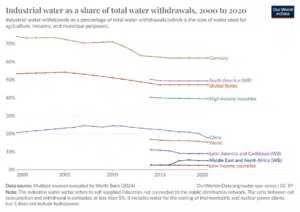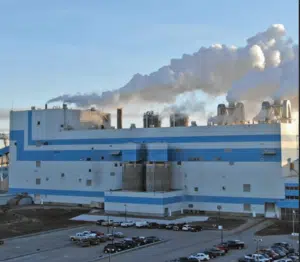Descubra el innovador depósito de pruebas de Isle en nuestra serie de blogs "Historias de éxito".
Reshmina William, PhD (Director de Proyectos, Isle Americas)
An Industrial-Scale Thirst for Water
Manufacturing is a thirsty business.
Estimating the exact amount of water withdrawn by industry is challenging – in the U.S., for example, water used by industry is often self-supplied and thus largely unregulated. However, global estimates show that in 2024, industrial water withdrawals comprised nearly 20% of global water withdrawals, surpassing municipal demand.

Water is used in industries ranging from pulp and paper manufacturing to the production of building materials like concrete and steel. We use water directly in the production of goods like beverages, as well as in cooling, heating, and other auxiliary processes. And that’s not even considering the water consumed in the production of the electricity used to power our manufacturing facilities!
Water quality is just as important as water quantity. Many types of manufacturing, such as semiconductor production, require ultra-pure water. Compromising the quality of the water used in production could thus jeopardize product quality and even human health and safety (in the case of the food and beverage industry).
Industrial wastewater can also be heavily contaminated. Depending on the industry in question, industrial wastewater might contain toxic metals, chemicals like lubricants and acids, and organics with high chemical oxygen demand (COD). Companies often install their own treatment facilities onsite to treat water to desired standards, before discharging to a downstream municipal sewer.
The Advanced Industrial Trial Reservoir
With all of the ways that water intersects with the manufacturing sector and an increasing appetite for sustainable practices among industrial partners, the opportunity was ripe for a new Trial Reservoir.
When Sivan Samir and her team at Xylem Innovation Labs were looking for novel approaches to “breaking the cycle” of the water innovation ‘piloting valley of death’, they were intrigued by the Trial Reservoir model. Xylem Innovation Labs quickly became one of the Reservoir’s main sponsors, even adopting some of the new technologies in the Reservoir pipeline for their own projects.
That “bullish” optimism about the Trial Reservoir model translated into Xylem Innovation Labs’ sponsorship of Isle’s second Reservoir, dedicated specifically to advancing water innovation in the industrial sector. Isle partnered with Xylem Innovation Labs to launch the Advanced Industrial Trial Reservoir in early 2023, with a focus on spotlighting novel technologies that enable resource recovery and the circular economy for the industrial sector.
Although still relatively young, the Advanced Industrial Reservoir has already successfully funded and implemented one trial, with another now underway.
EnBiorganic Technologies – A Trial Reservoir Case Study
Meadow Lake Mechanical Pulp Inc. (MLMP), located in Saskatchewan, Canada, processes a whopping 405,000 tonnes of pulp every year: enough to manufacture 81 billion sheets of standard A4 copy paper. Yet not a single drop of the wastewater generated in that process enters local lakes and streams. As one of Canada’s only zero wastewater pulp facilities, MLMP is proud of the fact that they recycle all of their wastewater onsite.
However, recycling that volume of high-organic wastewater produced a suite of problems: foul odors; a strange green tint to the water; and COD levels that frequently topped 1,500 ppm, leading to unwanted algal growth.
EnBiorganic’s proprietary system provides an easy-to-use, on-site solution to these challenges. Their EBS-Di microbial generation and dispensing unit is able to produce up to 40,000 L/day of tailored microflora able to biologically process contaminants from a variety of waste streams. The operation is fully automated and remotely controlled and monitored.
The EnBiorganic trial lasted six months. By its conclusion, the EBS-Di unit had not only exceeded the 30% COD reduction standard set in the trial’s key performance indicators, but had also led to significant reductions in MLMP’s odor and color issues.
Looking back on the trial, Simon Wiles, Technical Manager at MLMP, reflects that one of the biggest benefits was the reduction in the operational headache associated with managing the plant’s complex microbiome.
“Prior to this, we were trying to figure out how many bugs we had, what nutrient doses we needed, what add rates…” he recalls. Over the course of the trial, EnBiorganic took on full responsibility for the installation, upkeep and maintenance of the EBS-Di units and the building that housed them. From an operations perspective, the trial is already saving MLMP money “simply in terms of nutrients and additional bacteria,” Wiles says.
MLMP has signed a three-year procurement agreement for the continuous use of the EBS-Di system at their facility.
Interview with Peter Wessels
Peter Wessels first became involved with the Trial Reservoir after three years at Isle serving as a technical consultant for industrial clients exploring ways to improve water treatment or reduce their water footprint. In his work, he found that although clients were excited about the novel technologies available on the market, they were wary of allocating their limited budgets towards technologies that were new to their specific applications or industry. At the same time, Peter wanted to find a mechanism that allowed these new technologies to “prove themselves”.
The EnBiorganic/MLMP trial allowed him the opportunity to do just that.
Following the trial’s successful conclusion in 2023, Peter hopes to see others follow in its footsteps. As Peter explains, the Advanced Industrial Trail Reservoir offers a unique opportunity to “fast-track sustainable water practices across industry sectors” by encouraging the rapid adoption of new technologies.
Peter expects to see the expansion of the Trial Reservoir across different industrial sectors, testing a broader range of technologies. With that growth is likely to come both success and failure. But Peter sees failure as an important aspect of Reservoir growth. “It indicates that we’re taking necessary risks—a critical factor for fostering genuine innovation,” he says.
Although Peter is no longer part of the Isle Trial Reservoir team, he notes the impact that his work as a Trial Manager has had on his current role as a consultant at Nijaus Saur Industries. “Being part of the Trial Reservoir team has been an inspiring experience,” he says. “It’s given me deeper insight into the challenges faced by both industrial facilities and water technology providers and equipped me with strategies to address these challenges.”



